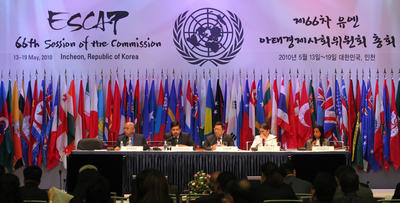It is one of the three ESCAP’s new subregional offices established under the UN General Assembly resolution 63/260 on 24 December 2008. The other two are for North and Central Asia (located in Almaty, Kazakhstan) and South and South-West Asia (based in New Delhi).
The Subregional Office for East and North-East Asia has become the first to start operating. This is partly due to enthusiastic support from the host government of Republic of Korea, which is also willing to sponsor SRO-ENEA’s future programs. The location of the UN office, in one of the most dynamic Korean cities and just a 30-minute drive from Incheon International Airport, seems almost ideal.
The membership of SRO-ENEA comprises six Northeast Asian countries – China, Democratic People’s Republic of Korea, Japan, Mongolia, Republic of Korea, and Russia. The work priorities for the subregional office include promoting sustainable development, reducing poverty and protecting the most-vulnerable, addressing climate change, promoting low-carbon green growth as well as transport and trade facilitation, and reducing disaster risk through information and communications technology. It will also act as the secretariat for the North-East Asia Subregional Programme for Environmental Cooperation (a UN-backed intergovernmental initiative involving China, Japan, DPRK, Mongolia, ROK, and Russia, which was launched in 1994).
The Mayor of Incheon Metropolitan City, Young-gil Song and the Director-General of the International Economic Affairs Bureau, Korean Ministry of Foreign Affairs and Trade, Kyungsoo Kim, delivered welcoming remarks to the Intergovernmental Consultation Meeting, while the Head of the Subregional Office, Peter Van Laere, delivered a welcoming message from Dr. Noeleen Heyzer, the UN Under-Secretary-General and Executive Secretary of ESCAP. Han Seungsoo, former Prime Minister of the Republic of Korea and Chairman of the Board of the Global Green Growth Institute, presented the keynote address.
The participants had in-depth discussions on Northeast Asia’s sustainable development challenges and on the agendas of multilateral cooperation in the region. Not of all the SRO-ENEA’s member-states were present. Unsurprisingly, the North Korean delegation did not attend, although an invitation had been issued. Overall, the meeting demonstrated that participating countries are genuinely interested in enhancing their collaboration in matters related to environmental sustainability and socio-economic development. The UN subregional office in Incheon is well positioned to play a catalytic role in promoting such partnership, not only among the governments but among the non-governmental entities as well, whose representatives, incidentally, have been very vocal during the Incheon meeting. Hopefully, SRO-ENEA will avoid the fate of another UN-sponsored project in Northeast Asia, Greater Tumen Initiative (formerly known as Tumen River Area Development Programme), which has been moribund for a long time.
Of course, ESCAP’s SRO-ENEA will not be a substitute for a full-fledged inter-governmental mechanism in Northeast Asia. Political and security issues are firmly outside its mandate. Yet, in a region still characterised by very low institutional density the arrival of one more multilateral forum should certainly be welcome.
Artyom Lukin is Associate Professor at Vladivostok Institute of International Relations, Far Eastern National University, Russia.

